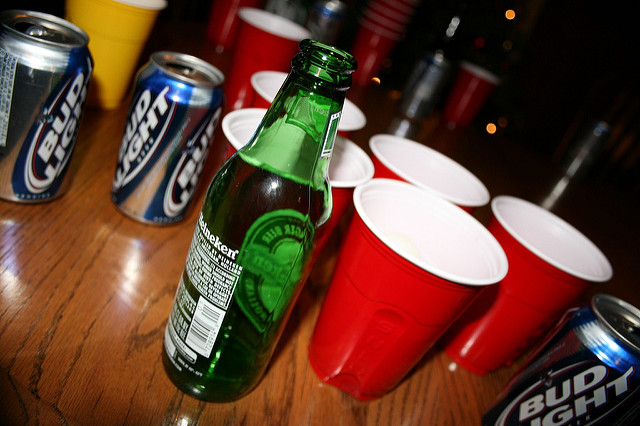Women who drink on empty stomachs are more likely to report being treated as sex objects
Researchers find a link between an unhealthy party trend and sexual objectification
Tara Santora • October 29, 2018

To get drunk and not gain weight, some college students avoid food before drinking. Women are more likely to do this if they feel treated like sex objects. [Image courtesy of Flickr user Melissa O’Donohue | CC BY-ND 2.0]
Female students who avoid eating before getting drunk report being sexually objectified more often, a recent study suggests. The party trend, called “drunkorexia” by popular media, has been sweeping through college campuses across the country.
Society pressures women to be both thin and heavy drinkers. Since alcohol’s calories can end up on people’s waistlines, many women eat less before partying to get drunk faster and avoid gaining weight, researchers report in the journal Women & Health.
Previous evidence has suggested this behavior disproportionately affects women. In 2010, scientists found that approximately 29 percent of male college students in the U.S. limit the amount of food they ingest before drinking compared to 45 percent of their female peers. The study also found that men who engage in this practice are more likely to get into a physical fight; women, in contrast, are more likely to lose memory, suffer injury, have unprotected sex and experience sexual assault.
In the new survey, researchers interviewed 263 female and 147 male college students from a private university in the U.S. To measure sexual objectification, they asked 15 questions, like: “How often have you noticed that someone was not listening to what you were saying, but instead gazing at your body or a body part?”
Their results show that college women who report high levels of sexual objectification spend more time limiting what they eat before going out to drink –– about four days per month on average –– than those who report low levels. In male students, however, scientists failed to find a relationship between sexual objectification and drunkorexia.
“Heterosexual men don’t have the same sort of pressures to stay thin that heterosexual women have,” says lead author Miriam Eisenberg, a health researcher who specializes in obesity, diet and exercise at Fors Marsh Group, a market research firm.
Results should be taken with caution: The team did not study whether sexual objectification causes drunkorexia in women. They only found that the two are related. Still, Eisenberg points out that “objectification may be a potential contributor” to drunkorexia.
Steven Giles, a body image researcher at Wake Forest University in North Carolina, questioned the decision to adapt the methodology used to identify sexual objectification, originally developed for women, to be unisex for the study.
“They used a measure that is primarily oriented toward women, and it’s possible that men experience sexual objectification behaviors differently,” says Giles, who was not involved in the study.
Another limitation is that the study only included heterosexual men and women. Gay men feel the effects of body shame and the drive to be thin even more than heterosexual men. The relationship between sexual objectification and drunkorexia may differ between queer and straight men, Eisenberg says.
To date, there is no clinical diagnosis for drunkorexia, but the practice can have real health consequences. Drinking on an empty stomach exacerbates the negative effects of alcohol, such as an increased risk of brain and organ damage. It may also be related to attention, learning and memory problems in young adults.
Eisenberg wants to find ways to reduce the negative impacts of drunkorexia and sexual objectification on college women. “I don’t think we’re there yet,” she says, “but it’s where we need to go.”